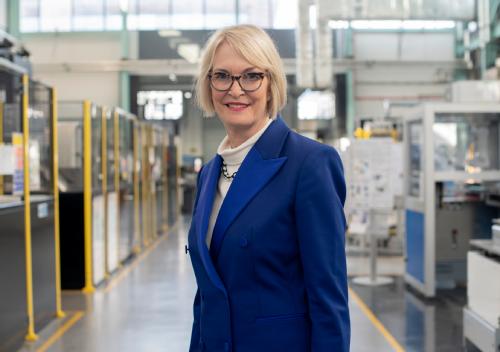WMG News
Skills England: Expert comment from Dr Ben Silverstone
Expert comment from Dr Ben Silverstone, Associate Professor, Workforce Transformation Strategy and Policy at WMG, University of Warwick
 “WMG welcomes the establishment of Skills England as a body to simplify and accelerate the skills system in the UK. As our economy is transformed, over the coming decades, the relationship between industry, education and government is critical in ensuring that the immediate needs of industry are met. Hand in hand with this, the further devolution of skills budgets to local areas will be essential in ensuring that place specific provision can be brought to bear, in a funded capacity, where businesses require support to meet local needs as part of a regional and national strategy.
“WMG welcomes the establishment of Skills England as a body to simplify and accelerate the skills system in the UK. As our economy is transformed, over the coming decades, the relationship between industry, education and government is critical in ensuring that the immediate needs of industry are met. Hand in hand with this, the further devolution of skills budgets to local areas will be essential in ensuring that place specific provision can be brought to bear, in a funded capacity, where businesses require support to meet local needs as part of a regional and national strategy.
“Investment in the further education system is much needed, and represents a critical, and widespread, recognition of the role that it plays in supporting businesses. The commitment to supporting young people is vital, but this does not go far enough.
“There is also a huge number of employees in the workforce in need of re skilling and upskilling - it is critical that the role of further education is not diminished in this capacity. We call upon the Government to make colleges bastions of industrial capability through skilling the existing workforce.
“Finally, the Apprenticeship Levy is in desperate need of change. We welcome commitments to expand its use. Enabling businesses to spend their levy contributions on impactful training, alongside high-quality apprenticeships, will increase investment in the workforce and prevent valuable funding from disappearing from the skills landscape where it goes unspent. We urge the Government to go further, and to allow levy paying organisations to transfer up to 100% of their unspent levy into their supply chain to support an integrated approach to capability development, helping to anchor industry in the UK.”
King’s Speech: Expert comment from Simon Webb
Expert comment from Simon Webb, Chief Technology Officer, at WMG at the University of Warwick
 "The announcements in the King’s Speech of a new industrial strategy, supported by a revived Industrial Strategy Council and devolved local growth plans, demonstrate a welcome commitment to growing the UK economy through long-term innovation, increased infrastructure delivery and building economic opportunity across the whole country.
"The announcements in the King’s Speech of a new industrial strategy, supported by a revived Industrial Strategy Council and devolved local growth plans, demonstrate a welcome commitment to growing the UK economy through long-term innovation, increased infrastructure delivery and building economic opportunity across the whole country.
"The support for 'sustainable growth by encouraging investment in industry, skills and new technologies' will be vital for UK economic success in key areas such as the decarbonisation of future transport and advanced manufacturing.
"As it looks to develop the Industrial Strategy, the government will need to consider the current needs of businesses and address their real world challenges. This is particularly important for SMEs and microbusinesses who may need additional support to improve their productivity and sustainability. The announcement of local growth plans and an Industrial Strategy Council are welcome steps to engaging with business on these issues.
"At WMG, we look forward to working with government and our industry partners to help deliver on these vital missions."
Expert comment from Dr Harjinder Lallie on the London hospitals cyber attacks
Dr Harjinder Lallie, Associate Professor (Cyber Security) at WMG at the University of Warwick explain: “The London cyber attack demonstrates the importance of cyber defences and proper back up plans, especially in organisations where it really can be a matter of life or death, like the NHS. With hospitals now having to resort to paper records in the wake of the attack, we must seriously weigh up the costs of defending ourselves versus the cost of doing nothing and accepting these attacks from hostile actors.
“With these attacks often able to manipulate our data as well as hold it to ransom, our most private data – such as our health records – must be protected more closely. To leave the medical information of patients out there without proper cyber security defence is the equivalent of leaving the files on a park bench or on a train. We must invest more in our own defences if we don’t want to see these types of attacks repeated time and again.”
Professor Alok Choudhary: Impact of the Red Sea crisis on global supply chains
 Expert comment from Professor of Supply Chain Management, Alok Choudhary.
Expert comment from Professor of Supply Chain Management, Alok Choudhary.
“The ongoing Red Sea crisis might have far-reaching consequences on the global supply chain, trade, and economic dynamics. Serving as the shortest sea route connecting Asia and Europe, the Suez Canal transports 17,000 ships annually, representing 12% of the world's total trade volume and $1 trillion worth of goods.
“The implications of this disruption on trade are significant. Rerouting ships an additional 3500 nautical miles is expected to result in significant delays, causing logistical challenges for major companies. The increased shipping and logistics costs incurred due to longer travel times are likely to be passed on to consumers, leading to a potential spike in prices for a wide array of goods, from everyday consumer items, oil and gas to crucial components for industries such as automotive and manufacturing.
“The ripple effect on production cycles is a cause for concern, as delays in delivering key components may lead to further disruptions. In particular, the automotive and consumer goods industries may face challenges in maintaining production schedules if crucial components do not reach their destinations on time.
“One of the most immediate impacts could be felt in the oil market, with potential consequences for global oil prices. The disruption in the timely transportation of both refined and crude oil through the canal may contribute to an increase in oil prices. This could have a cascading effect on economies, particularly in regions heavily reliant on oil imports, and may be reflected at fuel pumps worldwide.
“Here in the UK, the rise in oil prices could pose a challenge to economic stability and may halt falling inflation. Higher shipping and logistics costs, coupled with potential delays in the delivery of goods, might contribute to inflationary pressures. This could have broader implications for the UK economy, impacting consumer spending and overall economic growth.”
Read more about Supply Chain research at WMG here: https://warwick.ac.uk/fac/sci/wmg/research/research-areas/supply-chain
Mark Urbanowski, Principal Engineer, responds to the Government’s proposed cuts to active travel funding budgets
 Expert comment from Mark Urbanowski.
Expert comment from Mark Urbanowski.
Mark Urbanowski, Principal Engineer at WMG at the University of Warwick, said: “Travelling around the UK’s towns and cities is getting increasingly congested, polluted and unsafe. A key part of the solution to this problem, along with helping reach the UK’s Net Zero goal, is getting people and goods moved in efficient and clean vehicles, correctly sized for the journey, passenger and job requirements.
“Active travel, walking and cycling, as well as emerging micromobility transport options like e-bikes, e-cargo vehicles and e-scooters, need the right infrastructure to make them convenient and safe to use. Without investment for infrastructure and integration into the broader public transport system, modal shift to these vehicle types; by commuters, families and businesses; will languish behind the rest of Europe. It’s an issue we will be addressing at our Micromobility event in May.”
Margot James, Executive Chair, comments on the Government’s new Net Zero Strategy
Expert comment from Margot James, Executive Chair at WMG, in response to the Government’s Net Zero Strategy.

"The decarbonisation of personal transport, by moving to Electric Vehicles (EVs), will be a major contributor to delivering on this target as EVs become a viable option for the majority of consumers. Viability depends upon EVs being affordable and drivers having access to a reliable network of fast charging in urban and rural networks"
UK Government Net Zero Strategy
Find out more about the new National Skills Framework that has been created by WMG, The Faraday Institution and the High Value Manufacturing Catapult: New National Electrification Skills Framework and Forum could put the UK at the forefront of the green revolution News
Dr Ben Silverstone comments on the Government’s new Net Zero Strategy
Expert comment from Dr Ben Silverstone, WMG’s National Electrification Skills Framework and Forum Programme Lead, in response to the Government’s Net Zero Strategy.
“We welcome the Government’s Net Zero strategy and the commitment to reform the skills system to allow providers to be more responsive to industry need, which is what we have called for in the recently launched National Electrification Skills Framework. Our focus is to re-skill, up-skill and new-skill working with the automotive sector to ensure their workforce has the necessary skills to be able to meet the 2035 and 2050 targets set by government.”
Find out more about the new skills framework that has been created by WMG, The Faraday Institution and the High Value Manufacturing Catapult here: New National Electrification Skills Framework and Forum could put the UK at the forefront of the green revolution - WMG :: News (warwick.ac.uk)
WMG commends the advances to UK innovation, skills and industrial growth made by the Industrial Strategy Challenge Fund and supports NAO recommendations to further improve impact
 - Industrial Strategy Challenge Fund has brought government, business and researchers together at scale and at pace, supporting over 1,600 innovation projects, including Coventry’s UK Battery Industrialisation Centre
- Industrial Strategy Challenge Fund has brought government, business and researchers together at scale and at pace, supporting over 1,600 innovation projects, including Coventry’s UK Battery Industrialisation Centre
- NAO right to support streamlining start-up and approvals processes of up to 72 weeks, which can deter bids, especially among smaller businesses
- Longer term visibility of funding will be needed to give investment confidence to businesses and academia
- Mechanisms to engage private sector finance should be considered – especially as innovations become ready for market
- As industry faces challenges of the pandemic, flexibility in financing bids, especially to support smaller businesses, should be considered
- Regional and Skills strategies should be a key part of innovation funding approach
- The Catapult network provides an established and successful platform for innovation, and its geographic locations also suggest it could play a big role in regional levelling-up
- Skills must be developed alongside innovation to give the UK the ability to exploit our ISFC investments. WMG, at the University of Warwick, have been pioneers in developing skills programmes alongside innovation and industrialisation
WMG at the University of Warwick has welcomed today’s National Audit Office report on the Industrial Strategy Challenge Fund, supporting their positive assessment of the fund, and backed their calls for a more streamlined approach to innovation funding, alongside a greater emphasis on the importance of innovation for regional development and skills growth.
Professor Dave Greenwood, Director of Industrial Engagement at WMG, University of Warwick and Chief Executive of the WMG High Value Manufacturing Catapult said:
“The Industrial Strategy Challenge Fund (ISCF) has been a powerful tool to support innovation that meets the most pressing national challenges.
“The ISCF has bought government, business and researchers together at scale, and at pace, to help our transport industry decarbonise through the Faraday Battery Challenge, and is delivering vital vaccine capacity through the Vaccine Manufacturing and Innovation Centre. It has supported over 1,600 projects, including the new UK Battery Industrialisation Centre in Coventry, with over forty per cent of support in the first two waves going to small and Micro companies.
“These projects are making a difference to UK innovation, skills and industrial growth, and these successes should be celebrated.
“As the report says, however, there are always opportunities to improve how the Fund operates.
“First, we need to make the funding process faster and more agile – especially given rapid changes in the external Business and social environment, from Brexit to the Pandemic. Lengthy Approvals processes of up to 72 weeks for selecting challenges and awarding projects can deter bids, especially among smaller businesses.
“Alongside this, with much of industry dealing with financial pressures from the pandemic, government should consider relaxing some of the funding constraints on the programmes – especially where they fall significantly short of what state aid would allow, such as in the co-investment requirement from Industry, which was increased in Wave 3 of the Fund.
“Together, these steps would help position the UK for clean growth post-COVID and deliver on opportunities created for the UK supply chain by the UK/EU trade agreement.
“Looking forward, it’s essential that there is a long-term funding package in place to support the Industrial Strategy Challenges. As the report notes “The Fund was part of a one-year settlement in the spending review in November 2020.” Short term spending decisions will ultimately be detrimental to large scale industrial and academic investments – a 5 year rolling funding horizon is needed for full confidence from Industry partners. To help deliver this, we should consider the role of private finance in these programmes, and what mechanisms might de-risk industry investments to support clean growth.
“It’s also crucial that the ISCF supports regional development as part of the Government’s ‘levelling up’ agenda. Currently, almost half of funding has gone to projects in London and the South East, and while we in the West Midlands have secured significant investment, the ISCF should reflect the regional profile of Industrial R&D more closely. It is notable that government funding relative to private sector investment is much lower in the Midlands than in the South East for instance.
The Catapult network, with centres of excellence across the country, strong links to regional industries, and good networking between them, is an exemplar of how levelling up should be delivered. This established and successful platform could provide an efficient and effective means to boost R&D in under-represented regions in accordance with the recommendations of this report.
“We also need to link innovation spending to the education and skills agenda. The UK needs not just the best technologies but also the people to develop, manufacture and support them. These cannot be developed in isolation. Here, WMGs approach of delivering innovation and skills programmes together and in partnership with industry is an established model, allowing degree apprenticeships, re-training, lifelong learning to support industry innovation programmes. As the Government considers responses to the skills white paper, it should consider how future industry skills needs will be shaped by the innovations being delivered by the challenge fund, from transport electrification to digital skills.
Response to the Faraday Challenge announcement
 Professor Lord Bhattacharyya, Chairman, WMG, University of Warwick comments “I’m delighted to hear that the Government have announced plans to establish a centre for battery research in the UK. Not only will this support the Industrial Strategy, it will help change the perception of Britain from labs to manufacture.”
Professor Lord Bhattacharyya, Chairman, WMG, University of Warwick comments “I’m delighted to hear that the Government have announced plans to establish a centre for battery research in the UK. Not only will this support the Industrial Strategy, it will help change the perception of Britain from labs to manufacture.”
“Coventry and the sub region has a significant contribution to make in the delivery of the UK’s national industrial strategy, being in a strong position to lead the advancement of battery development, and vehicle electrification and autonomous vehicles. It will be at the heart of the drive to make the city a smart motor city.”
“Building on our automotive heritage, together with the Coventry and Warwickshire LEP, we are keen to develop and expand battery R&D, which will see the creation of these skilled jobs which will also be a trigger for other development by the private sector.
“Having a 37 year track record of working jointly with industry to innovate, and as leaders, for 15 years, in battery development, WMG are poised to continue to drive forward battery innovation and help create growth and employment in the UK.
The full announcement from the Business Secretary Greg Clarke MP can be heard here.
Expert comment: Dr Sudakshina Lahiri - Increased NHS demand is reshaping the service environment
 “As recent news headlines have highlighted, the demand for health and social care services is growing at an unprecedented rate. Demographic changes, presence of long-term conditions, technological advancements, and patient expectations are just some of the factors driving this growth.
“As recent news headlines have highlighted, the demand for health and social care services is growing at an unprecedented rate. Demographic changes, presence of long-term conditions, technological advancements, and patient expectations are just some of the factors driving this growth.
“Addressing the increased demand for service through an efficient integrated care delivery structure, that puts the patient at the centre of the service system, is an idea that has wide support. Developing that integrated framework of care will require thoughtful and systematic approaches however, including new ways of training the healthcare workforce, particularly those who are in middle management and tasked with the essential role of overseeing healthcare operational management.
“The increased demand is reshaping the service environment, making it dynamic and subject to rapid change. To address some of the challenges that come with such changes, it will be essential to provide health sector managers with the skills and knowledge to effectively operationalize issues of quality, productivity, and cost so as to ensure that the health service system delivers dual advantages of patient benefits while remaining efficient.
